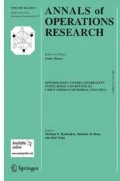Abstract
In this paper we present a general integer programming-based approach for the minimal perturbation problem in university course timetabling. This problem arises when an existing timetable contains hard constraint violations, or infeasibilities, which need to be resolved. The objective is to resolve these infeasibilities while minimising the disruption or perturbation to the remainder of the timetable. This situation commonly occurs in practical timetabling, for example when there are unexpected changes to course enrolments or available rooms. Our method attempts to resolve each infeasibility in the smallest neighbourhood possible, by utilising the exactness of integer programming. Operating within a neighbourhood of minimal size keeps the computations fast, and does not permit large movements of course events, which cause widespread disruption to timetable structure. We demonstrate the application of this method using examples based on real data from the University of Auckland.

Similar content being viewed by others
References
Ásgeirsson, E. (2012). Bridging the gap between self schedules and feasible schedules in staff scheduling. Annals of Operations Research, 218(1), 51–69. doi:10.1007/s10479-012-1060-2.
Barták, R., Müller, T., & Rudová, H. (2004). A new approach to modeling and solving minimal perturbation problems. In K. R. Apt, F. Fages, F. Rossi, P. Szeredi, & J. Váncza (Eds.), Recent advances in constraints. Lecture notes in computer science (Vol. 3010, pp. 233–249). Berlin: Springer.
Beyrouthy, C., Burke, E. K., Landa-Silva, D., McCollum, B., McMullan, P., & Parkes, A. J. (2007). Towards improving the utilization of university teaching space. Journal of the Operational Research Society, 60(1), 130–143.
Bonutti, A., De Cesco, F., Di Gaspero, L., & Schaerf, A. (2012). Benchmarking curriculum-based course timetabling: Formulations, data formats, instances, validation, visualization, and results. Annals of Operations Research, 194(1), 59–70.
Burke, E. K., Mareček, J., Parkes, A. J., & Rudová, H. (2008). Uses and abuses of MIP in course timetabling. In Poster at the workshop on mixed integer programming, MIP2007, Montréal, 2008. http://cs.nott.ac.uk/jxm/timetabling/mip2007-poster.pdf.
El Sakkout, H., & Wallace, M. (2000). Probe backtrack search for minimal perturbation in dynamic scheduling. Constraints, 5(4), 359–388.
El Sakkout, H., Richards, T., & Wallace, M. (1998). Minimal perturbation in dynamic scheduling. In H. Prade (Ed.), Proceedings of the 13th European Conference on Artifical Intelligence, ECAI-98.
Fukunaga, A. (2013). An improved search algorithm for min-perturbation. In C. Schulte (Ed.), Principles and practice of constraint programming. Lecture notes in computer science (Vol. 8124, pp. 331–339). Berlin: Springer.
Kingston, J. H. (2013a). Educational timetabling. In A. S. Uyar, E. Ozcan, & N. Urquhart (Eds.), Automated scheduling and planning, studies in computational intelligence (Vol. 505, pp. 91–108). Berlin: Springer.
Kingston, J. H. (2013b). Repairing high school timetables with polymorphic ejection chains. Annals of Operations Research, 1–16. doi:10.1007/s10479-013-1504-3.
McCollum, B. (2007). A perspective on bridging the gap between theory and practice in university timetabling. In E. K. Burke, & H. Rudová (Eds.), Practice and theory of automated timetabling VI. Lecture notes in computer science (Vol. 3867, pp. 3–23). Berlin: Springer.
Müller, T., Rudová, H., & Barták, R. (2005). Minimal perturbation problem in course timetabling. In E. K. Burke, & M. Trick (Eds.), Practice and theory of automated timetabling V. Lecture notes in computer science (Vol. 3616, pp. 126–146). Berlin: Springer.
Phillips, A. E., Walker, C. G., Ehrgott, M., & Ryan, D. M. (2014). Integer programming for minimal perturbation problems in university course timetabling. In E. Ozcan, E. K. Burke, & B. McCollum (Eds.), Practice and theory of automated timetabling X. Lecture notes in computer science (pp. 366–379).
Phillips, A. E., Waterer, H., Ehrgott, M., & Ryan, D. M. (2015). Integer programming methods for large-scale practical classroom assignment problems. Computers and Operations Research, 53, 42–53.
Rezanova, N. J., & Ryan, D. M. (2010). The train driver recovery problem—A set partitioning based model and solution method. Computers and Operations Research, 37(5), 845–856.
Rudová, H., Müller, T., & Murray, K. (2011). Complex university course timetabling. Journal of Scheduling, 14(2), 187–207.
Zivan, R., Grubshtein, A., & Meisels, A. (2011). Hybrid search for minimal perturbation in dynamic CSPs. Constraints, 16(3), 228–249.
Acknowledgments
This research has been partially supported by the European Union Seventh Framework Programme (FP7-PEOPLE-2009-IRSES) under Grant agreement #246647 and by the New Zealand Government as part of the OptALI project.
Author information
Authors and Affiliations
Corresponding author
Rights and permissions
About this article
Cite this article
Phillips, A.E., Walker, C.G., Ehrgott, M. et al. Integer programming for minimal perturbation problems in university course timetabling. Ann Oper Res 252, 283–304 (2017). https://doi.org/10.1007/s10479-015-2094-z
Published:
Issue Date:
DOI: https://doi.org/10.1007/s10479-015-2094-z




